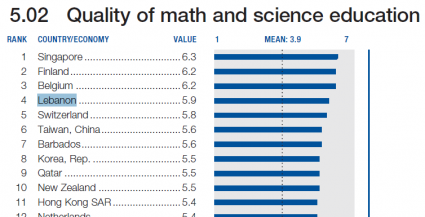
I posted almost a week ago on how Lebanon was ranked in the top 5 countries of the World for Maths and Science education and in the top 10 for Quality of the Educational System according to the World Economic Forum’s 2013 Global Information Technology Report.
For some reason, this piece of news got everyone’s attention and spread online like crazy. I have to admit I didn’t think it was that appealing as we ranked relatively bad in almost every other category so I didn’t bother go through the 300+ pages report and the methodology behind it to understand how those rankings were drawn out (even though one of the comments on the original post suggested something was wrong with the rankings).
Mouhammed Soueidane says:
I’m sorry to break it down to you, but make sure to check this link:
http://www3.weforum.org/docs/WEF_GITR_Report_2013.pdfGo to page 325(349 in the PDF file). The above graph was made based on a question that was asked to the Lebanese people. The question is:
How would you assess the quality of math and science education in your country’s schools?The above results are merely what the Lebanese people think about concerning the “Quality of math and science education” in their schools.
Fortunately though, The Beirut Spring shared today a post by Mohammad Alloush, a guest economist, who examined the report thoroughly and provided a proper explanation to the rankings proposed as well as the Real Position of Lebanon’s Education System. Check it out [Here].
The Real Position of Lebanon’s Education System
When it comes to secondary enrollment rates and primary completion we come at a whopping 87th place. Over 10% of children drop out of primary school, and this number is much higher in poor public schools. In adult literacy, we rank 88th. In tertiary enrollment rates, we rank 40th without saying much about the quality. In a UNESCO education index that takes many different aspects of the system into account, in 2010, our ranking was 70. We were 97th in 2007.
In an international quality of education test (TIMSS 2011), students in Lebanon got an average score of 449 on math which is 51 points below average. In terms of ranking, we came in 25th place out of 43 participating countries. Better still, in terms of achieving certain benchmarks, only 1% of Lebanese students achieved the advanced benchmark (3% is the world median), 9%, 38%, & 73% achieved the high, intermediate, and low benchmarks respectively. The world medians are 17%, 46%, and 75%. In terms of quality, we are clearly below average.
I don’t mean to berate nameless people on this. But if we don’t realize that something is wrong, then we have no incentive to fix it. [BeirutSpring]










I don’t know whether to laugh at the people who believed this, or cry at how pathetic it is that our inflatable opinions of ourselves are so wrong that they can give us a top world rank while we’re actually just third world garbage.
that escalated quickly
It is easy to believe as most of Lebanese who had graduated from reputable private schools in Lebanon have excelled and miles ahead of their peers abroad. You should still be proud of your schooling whether it is math or otherwise. After all no citizen of another country can assimilate almost four languages into one. 😀
To Danny,
Excelled? Miles ahead? If you hear about one Lebanese doing good abroad, you should check how many are doing just as good if not better. Lebanese are not so special in that aspect. We don’t create, we don’t innovate. We just copy and paste to make money. As for the languages, you should also get your facts straight. Switzerland, Luxembourg, Belgium china, Russia and almost 3/4 of the world can speak 3 languages. It’s the way the world is now. Also, 4 languages? What’s the fourth language? To my understanding Lebanese can barely speak three. We should stop inflating ourselves and maybe work on our flaws instead of hiding from them.
the fourth language is …. Syrian…:)
I lived in the states for 20+ years, when I came here for college, I couldn’t understand what the professor was saying in English, and yes, i was English educated in Lebanon in a private school, and guess who was teaching English there, Lebanese teachers with broken English language and bad accent. It took me over a year in college here to catch up on my English. I believe that most Lebanese people are worth a penny when they leave their airport. Sorry for being blunt but this the truth.
Actually Joe I’ve never heard any lebanese person who isn’t part Syrian speak Syrian ever. Although Lebanon is seemingly trying to become better, we still have a long way to go. All I’ve heard for many years was talk talk talk that Lebanon is gonna become better in the near future and we’re trying our best but no, Lebanon has always been the same. Old. Polluted. For the past 3 years nothing has changed or been done about the “garbage issue”. Politics are a joke. Ribal is right. It’s just copy and paste. We try to be like other countries so bad. But we never will be. Nothing is going into action. No one is doing what they said they would do. That’s why I chose to live abroad. It’s just that I can’t live here, and it’s hard to find a job. It’s like idk an earthworm in the desert. It will struggle to find water but it would just shrivel up and die in the end. I’m not sure if I have hope for Lebanon anymore.